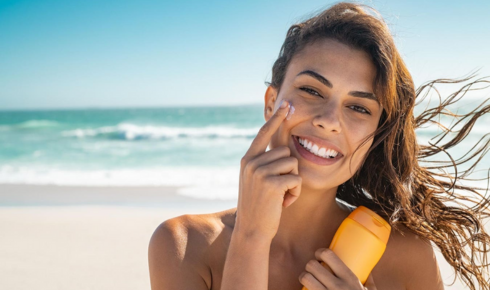
SPF 50
Every summer, we stock up on sunscreen, pack our beach bags, and promise ourselves that this year we’ll be smarter about sun protection. But despite our best intentions, many of us still fall for common sunscreen myths that put our skin at risk. The truth is, a lot of what we think we know about SPF is outdated or just plain wrong—and these misconceptions can lead to sunburns, premature aging, and even long-term skin damage.
Let’s bust the most popular sunscreen myths and uncover what you really need to know to protect your skin all summer long (and beyond).
Myth 1: You Only Need Sunscreen on Sunny Days
One of the most dangerous beliefs is that sunscreen is optional when it’s cloudy. But up to 80% of UVA/UVB rays can penetrate clouds. That means even on overcast days, your skin is absorbing harmful rays that contribute to aging, pigmentation, and skin cancer. SPF daily use is a must—not just for vacations or sunny weekends. Make applying sunscreen as routine as brushing your teeth, no matter what the weather says.
Myth 2: A High SPF Means You Can Stay in the Sun All Day
Using SPF 50 doesn’t give you a free pass to sunbathe for hours without reapplying. SPF tells you how long the product protects your skin from UVB rays—not how powerful it is. And no sunscreen, not even the highest SPF, lasts forever. Reapply every two hours, or more often if you’re swimming or sweating. And don’t forget that no sunscreen blocks 100% of rays—SPF 50 blocks about 98%, while SPF 30 blocks around 96%. The difference is marginal, but reapplication is what really matters.
Myth 3: One Application in the Morning Is Enough
This is one of the most common sunscreen mistakes. You might apply it before leaving the house and think you’re good for the day, but sunscreen wears off. Sweat, oil, water, and even towel drying can all break down your sun protection. To stay protected, especially if you’re outdoors, remember the rule: reapply every two hours, and after swimming, toweling, or heavy sweating.
Myth 4: Darker Skin Doesn’t Need Sunscreen
While melanin does offer some natural defense against the sun, it’s not enough to prevent damage. People with darker skin tones can still suffer from sunburn, hyperpigmentation, and skin cancer. The problem is that sun damage may appear differently—often as uneven tone or dark spots. Sun protection is essential for every skin tone.
Myth 5: Sunscreen Is Only for the Face and Body—Not Lips or Eyes
Your lips and eye area are delicate and often neglected, but they’re just as vulnerable. Use SPF lip balm and wear sunglasses with UV protection. For the skin around your eyes, use a sun protection product that’s safe for sensitive areas, like Bioderma’s Photoderm line, which is specifically formulated to protect and respect all skin zones.
Myth 6: Makeup with SPF Is Enough
SPF in foundation or BB cream is a nice bonus, but it’s rarely applied in thick enough layers to provide full protection. You’d need to use an excessive amount of makeup to match the coverage a standalone sunscreen gives. It’s best to layer your protection: apply a dedicated sunscreen first, then apply your makeup on top.
Myth 7: You Don’t Need Sunscreen Indoors
If you spend your day by a window, in the car, or under artificial lighting, you’re still exposed to UVA rays, which penetrate glass and contribute to aging. Even if you’re not getting burned, your skin can still suffer from long-term damage. Indoor lighting from screens and bulbs may also affect sensitive skin types. That’s why SPF daily use, even indoors, helps maintain youthful, healthy skin.
So what’s the smart way to protect yourself this summer? Choose a sunscreen like Photoderm from Bioderma. It’s formulated to protect against both UVA and UVB rays, with a lightweight, non-greasy finish perfect for daily wear. Whether you’re heading to the beach or just taking a walk in the park, it gives you the full-spectrum coverage your skin needs—without clogging pores or leaving a white cast.
Summer should be about fun in the sun, not skin regrets. Now that these sunscreen myths are busted, you’re one step closer to giving your skin the protection it truly deserves. Use SPF correctly, reapply often, and make sun protection a year-round habit. It is important what you put on your skin – no matter what we are talking about – cosmetics, some kind of Arabic perfumes, shampoo etc.







